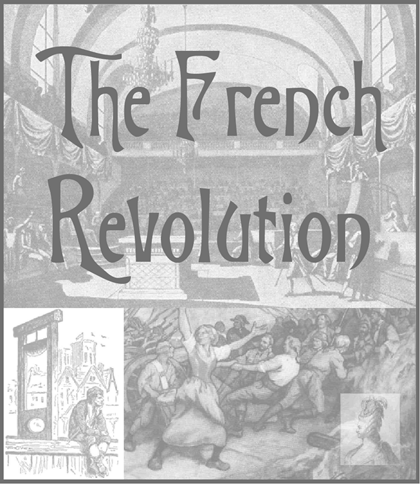 |
French Revolution (1789-1799) |
|---|
| www.studenthandouts.com > World History > French Revolution |
| French Revolution Books and Films | French Revolution Outlines and PowerPoints | |
| French Revolution Maps and Pictures | French Revolution Study Games | |
| French Revolution Miscellany | French Revolution Worksheets |
The French Revolution was a period of radical social, political, and cultural upheaval that took place in France from 1789 to 1799, and it is one of the most interesting topics to study in a World History or European History course. It marked a fundamental transformation in the country's political structure, ending the monarchy and leading to the rise of the French Republic. The French Revolution had far-reaching consequences not only for France but for the entire world.
Western European feudalism went out with a bang, to say the least! Causes: The French Revolution had deep-rooted causes, including financial crisis, widespread inequality, social injustice, and the influence of Enlightenment ideas that championed concepts of liberty, equality, and fraternity. France was burdened with debt, primarily due to extravagant spending by the monarchy and participation in costly wars.
Causes: The French Revolution had deep-rooted causes, including financial crisis, widespread inequality, social injustice, and the influence of Enlightenment ideas that championed concepts of liberty, equality, and fraternity. France was burdened with debt, primarily due to extravagant spending by the monarchy and participation in costly wars. Estates-General: The Estates-General was convened by King Louis XVI in May 1789 to address the financial crisis. It represented the three estates of French society: the clergy, the nobility, and the common people (the Third Estate). Disagreements over representation led to the formation of the National Assembly by the Third Estate, which declared itself the legitimate government of France. Tennis Court Oath: When the National Assembly was locked out of its meeting place, it met at a nearby tennis court and took the Tennis Court Oath on June 20, 1789, pledging not to disband until a constitution was established for France. Fall of the Bastille: On July 14, 1789, a mob of revolutionaries stormed the Bastille, a prison in Paris. The fall of the Bastille is celebrated as a symbol of the Revolution and is now France's national holiday, Bastille Day. Declaration of the Rights of Man and of the Citizen: Adopted in August 1789, this revolutionary document proclaimed the equality and rights of all citizens. It was influenced by Enlightenment ideals and served as a foundational text for democratic principles. Reign of Terror: The Revolution took a radical turn during the Reign of Terror (1793-1794), led by the radical Jacobins and Maximilien Robespierre. This period saw mass executions and repression of perceived enemies of the Revolution. Execution of Louis XVI: King Louis XVI was put on trial for treason and subsequently executed by guillotine on January 21, 1793. This event marked the abolition of the monarchy and the establishment of the French Republic. Rise of Napoleon Bonaparte: The Revolution eventually gave rise to Napoleon Bonaparte, a military general who seized power in 1799 and became the ruler of France. He later declared himself Emperor of the French in 1804. Napoleonic Wars: Napoleon's rule led to a series of wars across Europe known as the Napoleonic Wars (1803-1815). These conflicts had far-reaching consequences for Europe and ultimately led to Napoleon's defeat and exile. Legacy: The French Revolution had a profound impact on modern politics, philosophy, and society. It inspired revolutionary movements worldwide and laid the groundwork for the spread of democratic ideals and human rights. Impact on France: The Revolution led to significant changes in French society, including the secularization of the state, the end of feudal privileges, and the introduction of legal and political reforms. Cultural Contributions: The French Revolution also had cultural impacts, including the development of revolutionary symbols, such as the tricolor flag and the national anthem "La Marseillaise." Complexity: The French Revolution was a complex and multifaceted event with a range of actors and ideologies. It saw different phases, from moderate reform to radicalism and repression. The French Revolution remains a pivotal moment in world history, symbolizing the struggle for liberty, equality, and fraternity. It left a legacy of democratic ideals and the enduring pursuit of social justice and political reform. We trust that our many free educational materials will help you lead your students to understand this complex, fascinating topic. Amusez-vous! |
| www.studenthandouts.com > World History > French Revolution |






